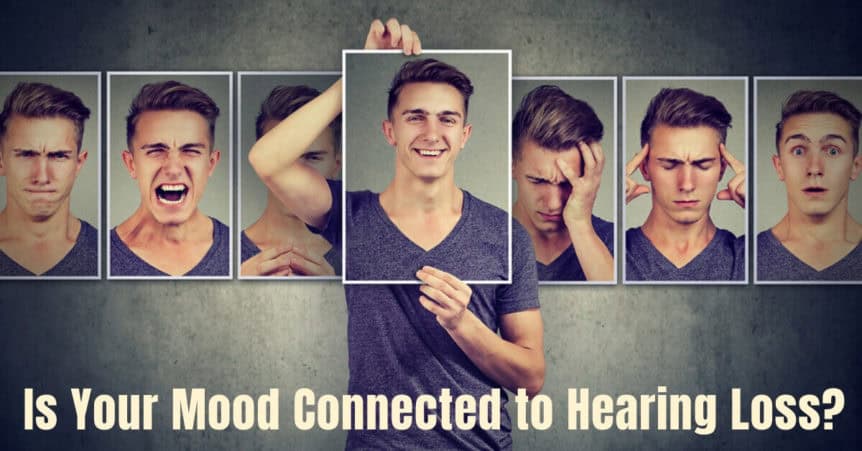- DIY Hearing Aid Maintenance Tips for The Summer - May 15, 2024
- A Closer Look at Common Myths About Hearing Loss - May 7, 2024
- The Impact of Pets on Emotional and Hearing Health - April 26, 2024
Hearing loss affects far more than your abilities to hear. Your hearing is in fact intimately interwoven with a whole host of other physical and psychological processes—it is wrapped up not only in your abilities to perceive your surroundings but also to communicate with friends, loved ones, and coworker. When you begin to experience hearing loss, or when your already existing hearing loss worsens, it can be very challenging to remain connected to the people and places that are most familiar to you. The sometimes-difficult process of adjusting to changes in hearing abilities is often accompanied by changes in one’s mood and can lead to sometimes serious mental health problems. Understanding how hearing loss and mood are related can be beneficial.
Understanding Hearing Loss
Firstly, some facts about hearing loss. Hearing Loss Association of America reports that there are approximately 48 million people in the United States who have some degree of hearing loss—that’s 20% of the population. Many of these people are older Americans, as hearing loss disproportionately affects older people. There are rising numbers of young people, however, who are also experiencing hearing loss. The hearing loss people experience is generally categorized as sensorineural or conductive. Sensorineural hearing loss occurs when the tiny hair cells in the inner ear become damaged—either from genetic causes or because of prolonged exposure to loud noises. Conductive hearing loss occurs when there is a blockage between the outer ear, the middle ear, and/or the middle ear, making it difficult for sound waves to travel and to be translated to your brain. This makes louder sounds can become muffled and softer sounds can sometimes not be heard at all. There is a third category of hearing loss that is a mix of the two forms just discussed: mixed hearing loss, which occurs when there are problems conducting sound to the inner ear, as with conductive hearing loss, and when the inner ear’s hair cells are also damaged, as happens in sensorineural hearing loss.
Studies on Hearing Loss & Your Emotions
Our hearing is entangled with our cognitive and emotional sensibilities, and our hearing shapes how we feel connected to ourselves and our surroundings. People with untreated hearing loss can feel increasingly disconnected because they can’t physically hear as they used to and, often as a result, because they feel socially isolated. A study conducted at the University of Washington – Vancouver investigated the links between hearing loss and mood by focusing on dopamine, in particular. Dopamine is regulated by the hypothalamus and regulates mood and behavior. The dopamine transporter that moves dopamine to nerve synopses throughout the body plays a key role in the health of auditory nerve neurons, in particular. Researchers will continue this research by focusing on how dopamine may alter how these neurons respond to certain sounds and voices.
Researchers at the University of Gothenburg also conducted a study on how hearing loss affects personalities and moods, which they published in the Journal of Personality. Researchers followed 400 people between 80 and 98 years old for six years, finding that people became less outgoing over time. Researchers suggest that this is directly the result of the increasing levels of hearing loss that the study participants experienced over time.
This is to say that there have been many studies confirming the links between hearing loss and moods. Another one is a 2014 study conducted by Dr. Chuan-Ming Li, who was located at the U.S. National Institute on Deafness and Other Communication Disorders. The study was published in JAMA Otolaryngology–Head & Neck Surgery. Li and their team used data collected from the U.S. National Health and Nutrition Examination Survey, which surveyed 18,000 people over the age of 18. People older than the age of 70 were given hearing tests, and people who were younger than that self-reported their hearing status. Everyone was also administered a questionnaire that helped researchers to understand the prevalence of depression amongst the study participants. The study found that depression increased as hearing loss increased.
Visit Us at New Leaf Hearing Clinic
The links between hearing loss and moods ranging from depression to anxiety are hard to ignore. There are steps you can take to ensure that you are not only caring for your hearing, but caring for your mental health as well. Consulting with a trained hearing health professional at New Leaf Hearing Clinic for a hearing test and to get guidance on the best next step forwards will start you on the path of lasting hearing health awareness.

